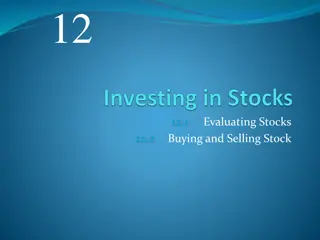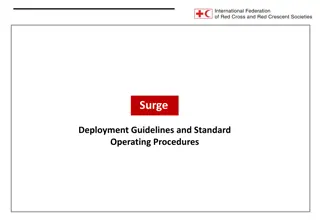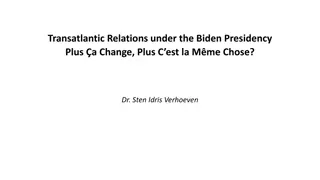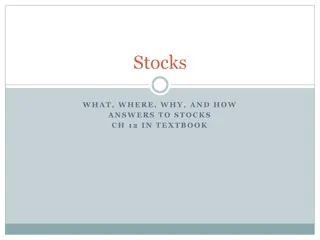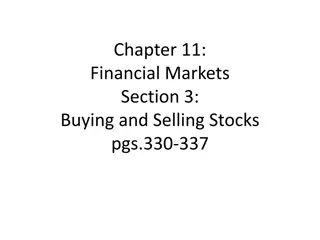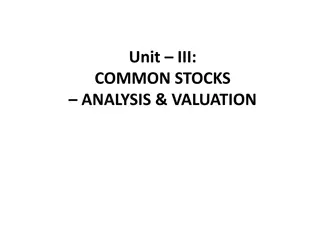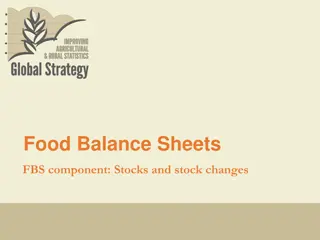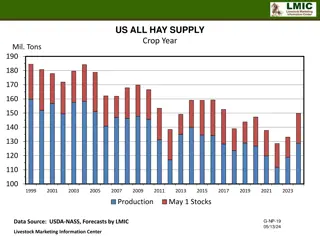Stocks Surge as Biden Emerges Winner: Weekly Market Overview
Stocks rallied significantly last week despite the election uncertainty, fueled by hopes of fiscal stimulus under a possible Biden presidency. The Fed maintained its policy stance, indicating tools to boost the economy. Employment data showed improvement, but rising COVID-19 cases threaten economic recovery. Equity market performance saw gains, with tech and small-caps outperforming. Bond yields fluctuated amid election news. Municipal bonds held up post-election but face challenges in certain states. Overall, market sentiment remains cautiously optimistic.
Download Presentation

Please find below an Image/Link to download the presentation.
The content on the website is provided AS IS for your information and personal use only. It may not be sold, licensed, or shared on other websites without obtaining consent from the author. Download presentation by click this link. If you encounter any issues during the download, it is possible that the publisher has removed the file from their server.
E N D
Presentation Transcript
Week in Review November 9, 2020 LAST WEEK IN REVIEW Last week, stocks posted their largest weekly rally since April, despite the lack of a clear winner emerging from Tuesday's presidential election as vote-counting continued in several pivotal states (note: A.P. has now announced Joe Biden, the winner). Investors began to anticipate a Goldilocks scenario of additional fiscal stimulus but more limited tax increases than under a "blue wave" Democratic sweep. The tech-heavy Nasdaq Composite Index and the small-cap Russell 2000 Index performed even better than the broad large-cap S&P 500 Index. Traders I spoke with noted that value stocks outperformed high-valuation growth companies early in the week. Still, the momentum that has driven many growth stocks higher all year took control following the election. While this was the second-busiest week of the quarter for earnings releases from S&P 500 companies, broad macro sentiment about politics and the economy seemed to drive the market.
U.S. MARKETS & ECONOMY Federal Reserve policymakers met on Wednesday and Thursday but announced no changes to monetary policy. The Fed's post-meeting statement noted that the coronavirus pandemic continues to weigh on economic growth meaningfully. In his press conference, Fed Chair Jerome Powell said that the central bank still has monetary policy tools it can deploy to boost the economy if needed and that policymakers discussed the outlook for the central bank's quantitative easing (Q.E.) programs. Powell left open the possibility that the Fed could expand its purchases of long- term Treasuries. The government's October employment report, released on Friday, showed that the economy added a better-than-expected 638,000 jobs last month, driving the unemployment rate down to 6.9% from 7.9% in September. However, COVID-19, the disease caused by the coronavirus, has surged in many parts of the country, with more than 100,000 new daily cases reported nationwide for the first time and hospitalizations rising. This widely anticipated fall wave of the pandemic caused some states and municipalities to consider adding new restrictions on consumer businesses, threatening to slow the labor market's improvement. U.S. EQUITY MARKET PERFORMANCE As of close Friday, November 6, 2020 Index Friday's Close Week's Change % Change YTD DJIA 28,323.40 1,821.80 -0.75% S&P 500 3,509.44 239.48 8.63% Nasdaq Composite 11,895.23 983.64 32.57% S&P MidCap 400 2,026.95 133.76 -1.75% Russell 2000 1,644.16 111.40 -1.46% Source: Bloomberg. This chart is for illustrative purposes only and does not represent the performance of any specific security. Past performance cannot guarantee future results. 2
US YIELDS & BONDS Longer-term Treasury yields ticked down during a volatile week, driven by election news. (Bond prices and yields move in opposite directions.) Indications that Republicans would retain control of the Senate led investors to revise expectations for new stimulus spending in the new year, which could have weighed on Treasury prices. Although the Fed did not make any changes at its monetary policy meeting, traders noted that Fed Chair Jerome Powell's comments about the possibility of expanding the central bank's purchases of long-term Treasuries might have also pressured yields. Municipal bonds held up well following the election, although the prospect of a divided federal government could result in less fiscal support for state and local governments. Munis benefited from limited new issuance and declining Treasury yields. However, in Illinois, general obligation bonds sold off after voters in the state rejected a graduated income tax amendment. The ballot measure's defeat enhanced investors' concerns that the state's credit rating could be cut to below investment grade. As a former municipal portfolio manager, I don't know why anyone would buy their bonds, period (just my opinion). The investment-grade corporate bond market received technical support as issuance virtually came to a halt around Election Day. Meanwhile, high yield corporates benefited from the strong equity rally and generally stable corporate earnings reports. Source: Madison.com via Google 3
US TREASURY MARKETS & WEEKLY YIELD CHANGE As of close Friday, November 6, 2020 3 Mth: 0.00 bps to 0.09% 10-yr: -0.24 bps to 0.63% 2-yr: -0.02 bps to 0.13% 30-yr: -0.33 bps to 1.38% Source: For the week ending Nov 6, 2020. Bloomberg. Yields are for illustrative purposes only and does not represent the performance 5-yr: -0.13 bps to 0.25% of any specific security. Yield changes are of one week. Past performance cannot guarantee future results. INTERESTING NEWS OVERSEAS Last week shares in Europe rallied in sympathy with U.S. equities while also receiving a lift from the generally strong quarterly earnings reported by European corporations and the additional stimulus measures announced in the U.K. In local currency terms, the pan-European STOXX Europe 600 Index ended the week 7.02% higher, while Germany's DAX Index rallied 7.99%, France's CAC 40 gained 7.98%, and Italy's FTSE MIB climbed 9.69%. The U.K.'s FTSE 100 Index advanced 5.97%. Core Eurozone bond yields bounced around but ended the week roughly level. The German 10- year bund yield, for example, plummeted on Wednesday after early U.S. election results proved indecisive. This downward pressure eased as the odds of a Biden victory, and a divided Congress appeared to increase. Yields on peripheral eurozone bonds fell overall. Aiming to prevent the spread of the coronavirus (or provide a "living wage" and begin the great reset in Europe), England started a nationwide lockdown that could last until the beginning of December. Greece also implemented a lockdown that will last three weeks to prevent the spread of the novel coronavirus. In France, which now has the highest caseload of infections in Europe, the mayor of Paris announced further restrictions to augment the nationwide lockdown, which began at the end of October. The Spanish government, which has imposed a nationwide nighttime curfew to deal with the second-highest number of coronavirus cases, came under pressure from regions to reimpose a nationwide lockdown. Italy classified four regions as red zones, where people must stay in their municipalities and are only allowed to leave for work, study, health, or other essential reasons. Japanese stocks finished sharply higher in the holiday-shortened trading week. Japan's stock markets were closed on Tuesday in observance of Culture Day. The Nikkei 225 Stock Average advanced 5.87% (1,348 points) and closed at 24,325.23. This week's market rally also lifted the widely watched market yardstick into positive territory for the year-to-date period (+2.8%). The large-cap TOPIX Index and the TOPIX Small Index, broader measures of Japanese stock market performance, also recorded strong results, although both remain underwater in 2020. Japanese stocks recouped their late-October losses (and closed the week at a multi-decade high) as uncertainty about the U.S. presidential election was offset by investor optimism about Japanese corporate earnings and better-than-expected Chinese manufacturing data. The yen strengthened and traded near JPY 103 versus the U.S. dollar. 4
INTERESTING NEWS OVERSEAS Cont Reuters reported on Friday that Japanese Prime Minister Yoshihide Suga has pledged to work closely with overseas authorities to maintain currency stability. He said that the government is closely monitoring the yen's movements for signs that it could hamper Japan's economic recovery. Chinese stocks advanced as the prospect of a Biden presidency raised the outlook for improved U.S.-China relations (shocker, I know). According to Reuters data, the benchmark Shanghai Composite Index ended up 2.2%, and the large-cap CSI 300 Index rose 3.4%. The yield on China's 10-year government bond increased to 3.22% as economic data showed that its recovery was on track. In currency trading, the renminbi rose 1.1% versus the dollar and closed at 6.621. Many policy analysts see scope for more cordial U.S.-China relations in trade, cross-border investment, and climate change. However, they caution that a significant re-engagement with China appears unlikely. U.S. policy toward China regarding intellectual property rights, technology transfer, and national security may not change much under a Biden administration. On the economic front, a batch of Purchasing Managers' Index (PMI) surveys added to evidence of China's rapid recovery from the coronavirus. The official PMI reports were both solid and suggested that Chinese business leaders had high confidence in Beijing's management of the economy. Meanwhile, PMI reports from the private Caixin survey were also strong, with the manufacturing gauge recording its highest level since 2011. Taken together, the latest PMI readings showed that China's robust economic momentum continued into the fourth quarter. However, new export orders and lagging employment figures hinted at some weakness in the recovery. In corporate news, the shock suspension of the widely anticipated USD 37 billion initial public offering (IPO) of Chinese fintech company Ant Group rocked the investment world. The last-minute postponement of what was on track to be the world's biggest-ever IPO, which the Shanghai Stock Exchange attributed to a changing regulatory environment, came after founder Jack Ma criticized China's banks and financial regulators an October 24 conference. Chinese regulators had been increasing their oversight of Ant Group well before Ma's speech and on Monday, issued draft rules calling for stricter regulations for online micro-lending companies. However, the suspension's timing just two days before Ant Group's public trading debut suggested that the authorities were uncomfortable with the fintech upstart's threat to China's politically connected financial institutions and its outspoken founder. Source: Pinterest via Google 5
THE WEEK AHEAD In the U.S., the consumer price report for October is set to highlight a slowdown in the inflation rate from September's six-month high, with the latest number set to remain well below the Federal Reserve's target of 2 percent amid subdued demand due to the coronavirus crisis. Simultaneously, the preliminary reading of Michigan consumer sentiment for November could show a slight improvement in morale despite the U.S. presidential election uncertainty. Other notable publications include producer prices, JOLTs job openings, IBD/TIPP Economic Optimism, and the government's monthly budget statement. Call us at LCP if you have any questions. Stephen Colavito, Jr. Managing Director Chief Investment Officer Private Wealth Chief Market Strategist Lakeview Capital Partners, LLC 1201 Peachtree Street NE Suite 1850 Atlanta, GA 30361 (404) 418-7776 (office) (404) 313-1388 (mobile) Past performance is not indicative of future results. Lakeview is an independent investment adviser registered under the Investment Advisers Act of 1940, as amended. This review does not constitute an offer to sell, or a solicitation of an offer to buy, any interest in any investment vehicle, and should not be relied on as such. Securities offered through SA Stone Wealth Management, Inc, member FINRA and SIPC. Advisory services provided through Lakeview Capital Partners, LLC ("LCP"). LCP is not affiliated with SA Stone Wealth Management. More information about the firm can be found in its Form ADV Part 2, which is available upon request by calling 404-841-2224 or by e- mailing info@lcpwealth.com The information contained in this e-mail message is intended only for the personal and confidential use of the recipient(s) named above. If the reader of this message is not the intended recipient or an agent responsible for delivering it to the intended recipient, you are hereby notified that you have incorrectly received this document and that any review, dissemination, distribution, or copying of this message is strictly prohibited. If you have received this communication incorrectly, please notify us immediately by e-mail and delete the original message. This message is provided for informational purposes and should not be construed as a solicitation or offer to buy or sell securities or any other financial instrument. Past performance is not a guarantee of future results. 6




